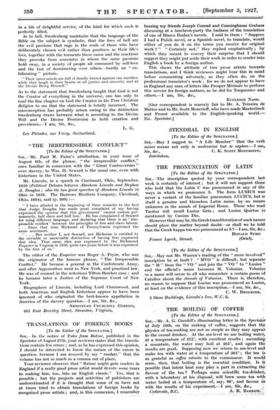" THE IRREPRESSIBLE CONFLICT" [To the Editor of the SPECTATOR.]
SIR,—Mr. Paul M. Paine's attribution, in your issue of ' August 6th, of the phrase, " the irrepressible conflict," once familiar in connexion with the " Great Controversies" over slavery, to Wm. H. Seward is the usual one, even with historians in the United States.
Mr. Lincoln, in a speech in Cincinnati, Ohio, September, .1859 (Political Debates between Abraham Lincoln and Stephen A. Douglas ; also the two great speeches of Abraham Lincoln in Ohio in 1859. The Burrows Brothers Company, Cleveland, Ohio, 1894), said (p. 309) " I have alluded in the beginning of these remarks to the fat4 that Judge Douglas has made great complaint of my having expressed the opinion that this government cannot endure per- manently, half slave and half free.' Re has complained of Seward for using different language, and declaring that there is an ` irre- pressible conflict' between the principles of free and slave labour. . . . Since that time Hickman of Pennsylvania expressed the same sentiment.
at s • • But neither I, nor Seward, nor Hickman is entitled to the enviable or unenviable distinction of having first expressed that idea. That same idea was expressed by the Richmond Enquirer in Virginia, in 1856, gnite two years before it was expressed by the first of us."
The editor of the Enquirer was Roger A. Pryor, who was the originator of the famous phrase, " The Irrepressible Conflict." He became a general in the Confederate Army, and after Appomattox went to New York, and practised law. He was of counsel in the notorious Tilton-Beecher case ; and he became later a Justice of the Supreme Court of New York.
Biographers of Lincoln, including Lord Charnwood, and both American and English historians appear to have been ignorant of who originated the beSt-known appellation in America of the slavery question.--I am, Sir, &c.,










































 Previous page
Previous page